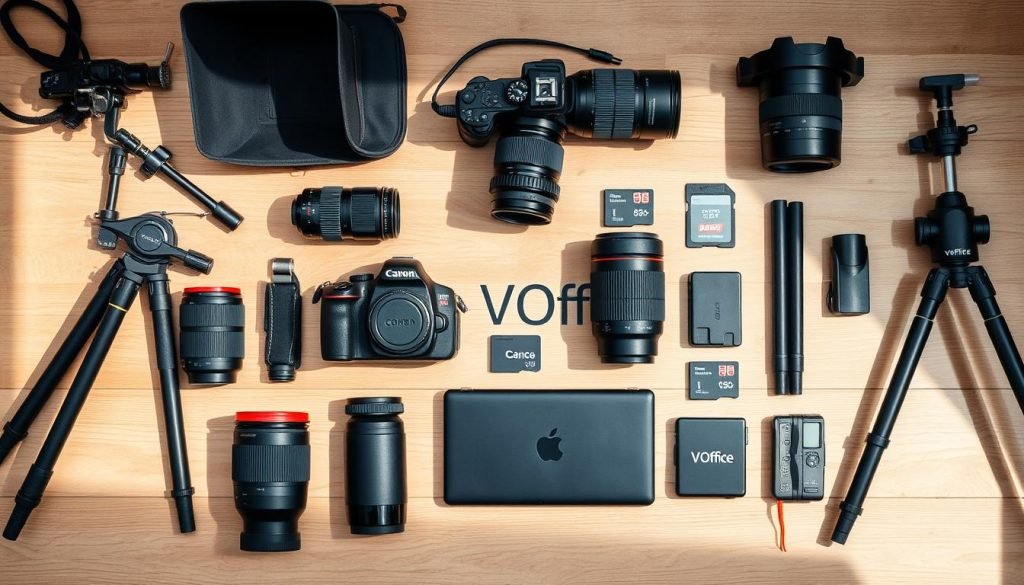Starting a photography business is an exciting journey, especially in Singapore’s vibrant market. This guide aims to help aspiring photographers turn their passion into a profitable career. With the right strategy and planning, photography can be a lucrative business.
If you’re wondering how to start a photography business, this guide is for you. It offers essential steps and considerations for a successful photography venture.
Understanding the Photography Market in Singapore
The photography market in Singapore is changing fast. More people are buying DSLR cameras, thanks to affordable prices and social media like Instagram and Facebook. These platforms make it easy to share photos.
But, many professional photographers are struggling to make a living. Some have given up, and others are moving to videography. This change means the quality of photography is going down.
Many clients want to pay less for photos, because there are so many photographers now. This makes it hard for photographers to make a good living. Clients often pick the cheapest option without knowing the quality difference.
Social media affects how clients see photography. But, many don’t understand the skill needed for great photos. This leads to less respect for photographers and wrong ideas about photo editing and smartphone cameras.
There are many photographers in Singapore, both pros and hobbyists. They often charge low prices, which lowers the value of photography. This hurts the quality of the industry.
To succeed, photographers need to study the market well. Knowing what customers in Singapore want helps them stand out. This way, they can find their own special place in the crowded market.
Identifying Your Photography Niche
Finding a photography niche is key for new photographers in Singapore. A clear niche helps you stand out and draw in specific clients. Areas like wedding, fashion, corporate, and portrait photography each need their own skills and marketing.
Look at the local market to see where you can offer something new. For example, aerial drone photography or unique engagement shoots can stand out. Being an expert in a niche lets you make special images that connect with certain people.
When thinking about your style, look at what others do and what you like. This helps you create a unique look that will appeal to clients. Keep improving your style, but stay true to your niche.
Trying out different types of photography can help you find what you love. Once you know your niche, you can market to the right people with your special work. Choosing a niche you’re passionate about makes your work more sustainable in a tough market.

| Photography Niche Types | Characteristics |
|---|---|
| Weddings & Elopements | Intimate, emotional storytelling through images |
| Corporate | Professional imagery for brands and businesses |
| Family & Newborn | Capturing familial bonds and significant milestones |
| Fashion | Trendy, dynamic photos for brands and designers |
| Pet Photography | Highlighting the unique personalities of pets |
By focusing on a specific photography niche, photographers in Singapore can grow their businesses and build a strong brand identity.
Starting a Photography Business: The Importance of a Business Plan
Starting a photography business needs a strong base. A detailed photography business plan is key. It helps measure progress, set goals, and spot challenges and chances. It also draws in investors, giving the funds to grow the business.
Key Components of a Photography Business Plan
A good photography business plan has key parts:
- Target Market Analysis: Know your ideal clients and how to find them.
- Financial Projections: Show expected earnings, costs, and how to manage money.
- Marketing Strategies: Plan how to reach and promote to your audience.
- Branding: Create a unique brand that stands out.
Why You Need a Business Plan for Long-term Success
Knowing your cash flow is crucial for a photography business. It helps track profits, check investments, and adjust plans as needed. A timeline keeps goals clear and finances in check.
Updating the plan often is key as the business grows. It ensures you keep checking your strategies, find ways to get better, and tackle challenges. A solid business plan gives direction, credibility, and opens up funding and marketing chances, boosting profits.
Registering Your Photography Business in Singapore
Starting a photography business in Singapore means following key steps. It’s important to know the business registration process. This keeps you in line with the law.
First, decide on your business structure. You can choose from:
- Sole Proprietorship – Best for solo photographers just starting.
- Limited Liability Company (LLC) – Protects your personal assets but needs more paperwork.
Registering your business is easy and can be done online in about an hour through the Accounting and Corporate Regulatory Authority (ACRA) portal. The cost to register your photography business license is between SGD 15 to SGD 300, based on your business type.
You’ll need to provide:
- Your business name.
- Personal ID like your NRIC or passport.
- Details about what your business does.
Getting a photography business license is key. It shows you’re serious and professional. Registering helps you get to important resources, meet other professionals, and draw in clients.

Starting a photography career can be tough, especially with the costs. Many new photographers see little to no income for the first year or two. Joining groups like the Professional Photographers Association Singapore (PPAS) can help. These groups offer support, share tips, and have discounts for members.
Registering your photography business in Singapore sets you up for success. It makes sure you follow the law and boosts your reputation in a crowded market.
Setting Up a Business Banking Account
Getting a business banking account Singapore is key for photographers to manage money well. It makes accounting and taxes easier, letting you focus on your work. Having a separate account helps you keep track of your money better. This is important for making smart choices.
When picking a banking for small business package, look at what you need. Here are important things to think about for your business account:
- Online Banking Services: Make sure your bank has good online banking or mobile apps for easy access.
- Mobile Check Deposit: Find a bank that lets you deposit checks with your phone for convenience.
- Little to No Extra Fees: Check the fees for minimum balances and transfers to avoid surprises.
- Responsive Customer Service Support: Look for banks with branches or strong customer support for help.
- Ability to Accept Credit Card Payments: Ensure your bank lets you take credit card payments for more options.
Getting a business credit card can also help your finances. Look for cards with bonuses, cash back, and rewards for your payments. Banks like Chase offer great options for small businesses.
Here’s a quick look at what your photography business needs:
| Feature | Description |
|---|---|
| Online Banking Services | Access to manage accounts through online platforms or apps. |
| Mobile Check Deposit | Deposit checks remotely using your smartphone. |
| Fee Structure | Details on any minimum balance requirements and transfer fees. |
| Customer Support | Availability of local branches or online support options. |
| Payment Processing | Options for credit card acceptance and electronic payments. |
Choosing the right banking setup helps photographers manage money better. This leads to more trust and easier dealings with clients and suppliers. A well-organized financial approach is key for your photography business.
Choosing the Right Equipment for Your Photography Business
Choosing the right equipment is key to starting a successful photography business. The right tools help capture amazing images and make your work easier. This guide covers both basic and special photography gear for different styles. Knowing the importance of each piece can greatly improve your work’s quality.
Essential Gear and Accessories
Starting out, you might need a basic camera kit that includes:
- One camera body (Canon is a top choice for many)
- Two batteries for shooting without stopping
- Two memory cards for storing your photos
- A 35mm lens for flexibility
- A 50mm lens great for family shots and portraits
- An 85mm lens for close-ups
- A speedlight to improve lighting
- A computer for editing and talking to clients
High-quality memory cards are a must to protect your client’s files. Keep two copies off-site and use cloud backup services. An external hard drive is also good for keeping your data safe.
Understanding Equipment Specific to Your Niche
For niche photography, think about what your special area needs. For example:
- Portrait photographers should consider a 50mm lens for its versatility and quality.
- Be careful with lighting gear; renting first can help you find the right fit.
It’s important to compare different equipment before buying. Renting camera lenses lets you see how they last and fit your style. Make sure your first buys match your photography business goals.

Having the right basic gear helps your business grow. Using Lightroom for editing and a MacBook Pro for editing photos keeps your work smooth and professional.
| Equipment Type | Initial Recommendation | Notes |
|---|---|---|
| Camera Body | Canon | Popular choice in the industry |
| Lenses | 35mm, 50mm, 85mm | Essential for various photography styles |
| Battery | Two | For extended shoot time |
| Memory Cards | High-quality, with spares | For reliable data storage |
| Software | Lightroom | Industry-standard photo editing |
| Backup Storage | External Hard Drive | To ensure data security |
As your photography business grows, add more gear that suits your needs. This way, you keep quality up without spending too much.
Creating Your Photography Portfolio
Creating a strong photography portfolio is key to drawing in clients and showing off your style. It’s all about quality over quantity. Beginners can start with a few standout images. Experienced photographers can show up to one hundred photos that highlight their specialty.
Think about different ways to display your work, like printed books, mounted prints, and digital portfolios. Each way has its own impact. Printed portfolios make a big impression during meetings, adding to the story of your photos.
Online sites like 500px.com, Flickr.com, and Smugmug are great for sharing your photos. They offer both free and paid options, letting photographers match their portfolios to their style and audience. Tailoring your portfolio for certain clients, like those looking for wedding or sports photos, can boost engagement and interest.
Social media isn’t the best place for your portfolio because of image compression and fast scrolling. Instead, use a mix of professional websites and specific photography platforms to keep your images looking great.
A well-chosen portfolio is a strong sales tool, more than just a showcase of skills. Think of it as a movie—each photo adds to a story that grabs your audience. Most successful portfolios have 12 to 25 key images, picked from an edit of 40 to 60. Showing your work is about telling your unique story to clients, leading to successful projects.
Marketing Strategies for Your Photography Business
Using effective marketing strategies is key to getting clients and making your photography business successful. Social media, like Instagram and Facebook, is very powerful for photographers. By sharing your work and talking with potential clients, you make connections that can turn into bookings.
Utilizing Social Media to Attract Clients
Here are some ways to use social media well for your photography business:
- Share behind-the-scenes content to humanize your brand.
- Post tutorials to show off your skills, which can inspire aspiring photographers.
- Use client testimonials to build trust by showing happy customers.
- Join local groups on Facebook to reach more people.
- Do giveaways with local businesses to draw in more followers.
Building a Professional Website
Having a professional photography website is very important. In Singapore, people look for services online, so it’s key for credibility. Here are some tips:
- Make sure your website looks good and is easy to use.
- Make it easy to find on search engines.
- Show off your unique style in the gallery.
- Keep your content fresh by updating it every 2-3 months.
- Use landing pages for specific topics to improve SEO and guide potential clients.
By using these strategies together, you’ll have a strong marketing plan. It will not only show off your work but also bring in new clients.

Starting a Photography Business: Pricing Your Services
Creating a clear pricing strategy for photography is key to success. It’s important to know what others charge in your area. This helps photographers set their own prices and stand out from the competition.
There are different ways photographers price their work. For example, some charge about $300 for an hour of shooting and give clients unedited photos on a CD. Others offer a more personal service and charge more because they spend more time with each client.
Knowing your costs is crucial for setting prices. Things like camera gear, editing software, and marketing costs add up. Direct costs, like printing and packaging, also affect your pricing. For instance, a framed 11×14 print might cost around $150.
- Minimize waste by sourcing materials in bulk.
- Consider selling images digitally to lower costs.
- Analyze overhead expenses, including insurance and software subscriptions.
When pricing, think about how much time and effort goes into each photo. Offering a few packages, like two or three for weddings, makes it easier for clients and helps with pricing.
Knowing how many shoots you can handle is important for pricing. This way, photographers can make a good living and still provide top-notch service.
Understanding Legal Considerations for Your Photography Business
Starting a photography business means you need to think about legal stuff. You should know about photography licensing laws and contracts for photographers. This helps protect your business and follow the rules.
Choosing how your business is set up is key. You can go for sole proprietorship, partnership, LLC, or corporation. Talking to a lawyer or tax expert can help pick the best one. Sole proprietorships are easy to start but don’t separate your personal and business stuff. An LLC does separate them, keeping your personal stuff safe from business problems.
Getting the right permits and licenses is crucial for legal operation. You might need a general business license, sales tax permit, and permits for your location. Making clear client agreements and model release forms helps avoid legal problems. You own the copyright for your photos automatically. But, registering them with the Copyright Office gives you even more protection against people using your work without permission.
Thinking about insurance is also important. Liability insurance covers accidents during shoots, and equipment insurance covers gear loss or damage. Getting professional indemnity insurance is a good idea too. It helps pay for legal costs and compensation if a client isn’t happy. Business interruption insurance can help keep your business running if something unexpected happens.
Finally, it’s important to keep up with tax rules, deductions, and legal changes. Knowing about data protection and keeping good records helps keep your personal info safe and lowers your tax bills.

Networking and Building a Client Base
Networking is key for photographers wanting to grow their business. It helps build strong client relationships, leading to more opportunities and a better reputation. Being active in photography events lets you meet others with skills you can use together.
First, find people in your field to connect with. Look for mentors, partners, and ways to get more clients. Use both online and offline networks to grow. Instagram and LinkedIn are great for showing your work and talking to others. But, don’t forget about in-person events and clubs for deeper connections.
Building real relationships means talking deeply, showing you care, and joining in on discussions. A strong network offers support and advice, keeping you motivated. It also helps you stay up-to-date with the latest in photography.
Did you know over 75% of new clients for photographers in Singapore find them on Instagram? A single photoshoot made over $30,000, showing how networking can pay off. But, it’s not just about having many followers. Talking directly with clients keeps them coming back.
It’s not just about getting new clients. Making sure each client feels special is key. Events like portfolio reviews give you feedback to get better. Working with other creatives, like food stylists, can make your work stand out.
Starting with cold emails can help you reach out to potential clients. Write messages that are warm and real to grab their attention. Good SEO also helps people find you online, making it easier to meet clients in Singapore.
Conclusion
We looked at the key steps to start a photography business in Singapore. Making a strong business plan, getting the right gear, and knowing your market are crucial. Starting can be tough, with costs and the need to build a good client base. But, with hard work and smart plans, you can make it.
Adding different services like weddings, portraits, and events can make your business more profitable. Always work on getting better through networking and great customer service. This will improve your reputation and bring more benefits than just money.
In the end, success in photography means being strong and flexible. Use the resources you have and stick to your goals. Keep being creative, listen to feedback, and you’ll have a rewarding career.
FAQ
What are the first steps in starting a photography business in Singapore?
How do I identify my photography niche?
Why is a business plan necessary for my photography business?
What are the key components of a photography business plan?
How can I register my photography business in Singapore?
What equipment do I need to start my photography business?
How should I price my photography services?
What legal matters do I need to consider for my photography business?
How can I effectively market my photography business?
What are some networking strategies for photographers?
Source Links
- https://www.flashpixs.com/how-to-set-up-a-photography-business-in-singapore/
- https://www.shopify.com/sg/blog/how-to-start-a-photography-business
- https://skaichanphotography.com/photography-is-a-sunset-industry.php
- https://fewstones.com/things-you-should-know-about-corporate-photography-in-singapore
- https://ppas.sg/photography-business-calculator/
- https://www.iphotography.com/blog/how-to-find-your-niche-in-photography/
- https://www.magazinemama.com/blogs/editors-blog/how-to-find-your-niche-as-a-photographer?srsltid=AfmBOopxlJ6dxD2vNyqes-0fZjYzhvvyWc4RNwkpSS4jZRDhbUkj4xpe
- https://kelseypasmaphoto.com/the-power-of-finding-your-niche-as-a-creative/
- https://trafft.com/business-plan-for-photographers/
- https://catieronquillo.com/how-to-start-photography-business/
- https://ppas.sg/how-to-start-your-photography-business/
- https://thecontractshop.com/blogs/posts/how-to-start-a-photography-business-with-no-experience
- https://blog.suzi-pratt.com/photography-business-bank-account/
- https://www.agencyaccess.com/blog/post/the-one-only-photography-business-checklist-you-need/
- https://www.forbes.com/advisor/business/how-to-start-a-photography-business/
- https://www.creativelive.com/blog/equipment-needed-to-start-a-photography-business/
- https://ashleyammons.com/2023/08/23/must-have-equipment-for-photographers/
- https://www.kevinlj.com/a-practical-guide-to-creating-a-photography-portfolio/
- https://fstoppers.com/business/where-start-when-building-photography-portfolio-643492
- https://conservationvisuals.com/tutorials/editing/make-a-photography-portfolio/
- https://blog.pixieset.com/blog/marketing-ideas-for-photographers/
- https://www.picdrop.com/web/articles/photography-marketing-strategies
- https://www.theclickcommunity.com/blog/pricing-for-profit-how-to-make-it-in-the-business-of-photography/
- https://www.format.com/magazine/resources/photography/how-to-price-photography
- https://joymichelle.co/tips-for-pricing-your-photography-services/
- https://summerana.com/legal-considerations-to-be-aware-of-when-starting-a-photography-business/
- https://orah.co/legal-considerations-for-your-photography-business/
- https://www.auberginelegal.co.uk/post/legal-guide-for-running-a-photography-businesses
- https://blog.pixifi.com/old/photography-studio-client-experience/networking-strategies-for-photographers-expanding-your-client-base
- https://ericaandjon.com/photography-education/how-to-build-a-client-base/
- https://lindsaykphoto.com/how-to-grow-a-client-base-as-a-photographer-la-product-photographer/
- https://10web.io/blog/how-to-start-a-photography-business/
- https://fstoppers.com/business/becoming-and-finding-successful-photography-business-586090

